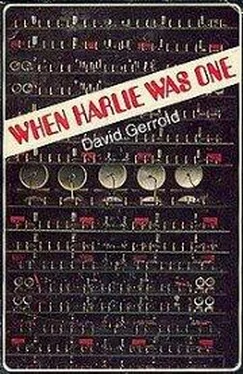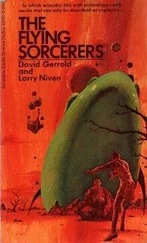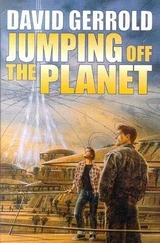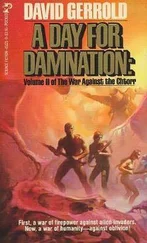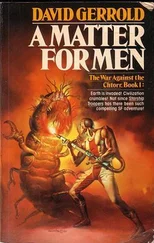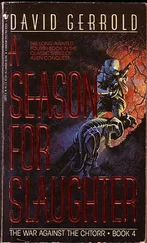David Gerrold - When HARLIE Was One
Здесь есть возможность читать онлайн «David Gerrold - When HARLIE Was One» весь текст электронной книги совершенно бесплатно (целиком полную версию без сокращений). В некоторых случаях можно слушать аудио, скачать через торрент в формате fb2 и присутствует краткое содержание. Год выпуска: 1972, ISBN: 1972, Издательство: Doubleday, Жанр: Фантастика и фэнтези, на английском языке. Описание произведения, (предисловие) а так же отзывы посетителей доступны на портале библиотеки ЛибКат.
- Название:When HARLIE Was One
- Автор:
- Издательство:Doubleday
- Жанр:
- Год:1972
- ISBN:978-0345028853
- Рейтинг книги:3 / 5. Голосов: 1
-
Избранное:Добавить в избранное
- Отзывы:
-
Ваша оценка:
- 60
- 1
- 2
- 3
- 4
- 5
When HARLIE Was One: краткое содержание, описание и аннотация
Предлагаем к чтению аннотацию, описание, краткое содержание или предисловие (зависит от того, что написал сам автор книги «When HARLIE Was One»). Если вы не нашли необходимую информацию о книге — напишите в комментариях, мы постараемся отыскать её.
Nominated for Nebula Award for Best Novel in 1972.
Nominated for Hugo Award for Best Novel in 1973.
When HARLIE Was One — читать онлайн бесплатно полную книгу (весь текст) целиком
Ниже представлен текст книги, разбитый по страницам. Система сохранения места последней прочитанной страницы, позволяет с удобством читать онлайн бесплатно книгу «When HARLIE Was One», без необходимости каждый раз заново искать на чём Вы остановились. Поставьте закладку, и сможете в любой момент перейти на страницу, на которой закончили чтение.
Интервал:
Закладка:
“Of course, you’d have no way of knowing—” Auberson grinned. “Would you? Besides, it wouldn’t keep me from doing research in a new field. By your own admission, HARLIE is a non-human computer. And if I went to IBM, I definitely would not be working on non-human computers.” He leaned back in his chair. “ Any new employer I went to work for couldn’t help but benefit from my knowledge and previous experience—” Dome was scowling now. Auberson paid no heed. “—and you wouldn’t dare bring it to court because to do so you’d have to reveal HARLIE’s schematics — and that’s the last thing in the world you want As soon as they found out the schematics were human, you’d be right back where you started.”
“I don’t care about that,” rapped Dome. “It’s the company’s technological advantages.”
“Technological advantages?” Auberson repeated — and suddenly he realized. “That’s what this whole thing is about, isn’t it? You don’t want to be forced to reveal company secrets in the courtroom.”
Dome didn’t answer.
“It is the reason, isn’t it? Rather than be forced to give up the precious secret of your judgment units, you’d throw HARLIE to the wolves. You’d toss away valuable employees, too, in order to protect a temporary industrial edge. Well, it won’t work, Dome. Either way, you’re bound to lose, but if you fire me, you’ll lose faster — and more disastrously.”
Dome paused, a silver cigarette lighter halfway to his mouth. “You overestimate your own importance, Aubie.”
“No. You underestimate the importance of HARLIE.”
Dome lit his cigar. He took his time about it, making sure that it caught evenly. When he was sure it had, he pocketed the lighter and looked at Auberson.
“All this is only speculation, of course. I have no intention of firing you. And you’ve stated quite clearly that you have no intention of resigning. However, that still leaves us with a difficult problem.”
“Does it?” Auberson was impassive.
Dome raised an eyebrow at his coolness. “I think so. What are we going to do about HARLIE?”
“Oh? Not ‘Can HARLIE make money for the company?’ ”
Dome looked pained. “Preferably that,” he conceded.
“Well then, why not say so? Or have you already made up your mind that HARLIE can’t?”
“No, I haven’t. I’m waiting for you to come up with something. That was the deal, wasn’t it? If you can, fine. Then we know where we go from there. If not, well…” Dome shrugged, he didn’t need to finish the sentence.
“Look,” said Auberson. “I want HARLIE to show a profit as much as you do. I’ll agree with that. He’s got to be more than just a high-priced toy.”
Dome looked at him. He fingered the document on his desk thoughtfully. “Okay, Aubie,” he said. “I’ll tell you what we’re going to do—” He paused for effect, picked up the single sheet of paper, opened a desk drawer and dropped it in. “Nothing. At the moment, we’re going to do nothing. Confidentially, I didn’t expect you’d sign it, no matter how I pressured you. I even told Chang that. No matter; it was too easy an answer. If HARLIE’s humanity ever comes to a court issue, it will be a bigger and uglier and stickier mess than that disclaimer can clear up. Or any disclaimer.” He pushed the drawer shut as if it contained something distasteful. “Let’s hope it doesn’t come to that. You’ll continue to work on the HARLIE project. As you said, we’re budgeted for it. If you can produce results, fine; then we can forget this conversation. Oh, we’ll give you a fair chance, we’ll be more than fair; but if HARLIE doesn’t do something to indicate he can be productive — and do it before the next budget session — well,” — Dome hedged; he didn’t want to come right out and say it bluntly — “well, we’d have to do some serious thinking — really serious thinking — I mean, it would be very unlikely that we would continue his appropriation…”
“I understand,” Auberson said.
“Good. I hope you do. I want you to know how we feel. We haven’t cancelled your day of judgment, Aubie. Only postponed it.”
It was a little place, hardly more than a store front. Maybe once it had been a laundry or a shoe store; now it was a restaurant, its latest incarnation in a series that would end only when the shopping center of which it was a part was finally torn down. If ever.
Someone, the owner probably, had made a vague attempt at decorating. Pseudo-Italian wine bottles hung from the ceiling along with clumps of dusty plastic grapes and, unaccountably, fishnets and colored glass spheres. A sepia-toned wallpaper tried vainly to suggest Roman statuary on the southern coast of Italy, but in this light it only made the walls look dirty. Flimsy trellises divided the tables into occasional booths, and the place had that air of impermanence common to small restaurants. A single waitress stood at the back talking quietly to the cook through his bright-lit window.
If one ignored the glare from the kitchen, the rest of the room was dimly lit. Red tableclothes were echoed by red-padded chairs. Scented candles in transparent red fish-bowls augmented the murk with a crimson flicker of their own.
With the exception of one other couple, they were alone in the place. But even had the room been filled with chattering others, they would have still been alone.
“I tell you, Annie,” Auberson was saying, “I knew he was pressuring me, but there was nothing I could do about it.”
She nodded, took a sip of her wine. In the dark her eyes were luminously black. “I know. I know how Dome is.” She set the wineglass down. “His problem is that he’s trying to be boss of too many things. He calls you in to talk even when there’s nothing to say.”
“That’s what this was,” he said. “Logically, he knew it was too early to expect results — but he felt he had to demand them anyway.”
She nodded again. “I’ve long suspected that Mr. Dome has reached his level of incompetency. If he’s ever given any more authority, he’ll be in over his own head.”
“How much higher can you get than Chairman of the Board?”
She shrugged. “ I don’t know, but he’s working on it. The way he keeps taking over more and more jobs — it’s frightening. You know, don’t you, that he has no intention of hiring a new president?”
“I’d kind of guessed it.”
“I think he’s afraid that he isn’t indispensable, so he’s taking on more and more responsibility to prove the opposite. I don’t think it’s a good idea — it certainly isn’t good for the company.”
“Should you be saying that?” Auberson asked. “After all, you do work for him.”
“With him,” she corrected. “I only work with him. I’m an independent unit in the corporate structure. My job is what I want to make of it.”
“Oh? And what do you want to make of it?”
She was thoughtful. “Well, I interpret my function as being that of a buffer — or a lubricant to minimize the friction between certain departments.”
“I see. Is that why you accepted my dinner invitation? To keep me from chafing against Elzer?”
Annie made a face. “Oh, that awful little man. You would have to bring him up.”
“I take it you don’t like him.”
“I didn’t like him even before I knew him. His family was in my father’s congregation.”
“Oh? I didn’t know that Elzer was—”
“Carl Elzer and I have one thing in common,” she said. “We’re both ashamed that he’s Jewish.”
Auberson had to laugh at that. “You’ve got him pegged, Annie. I hadn’t realized it before, but you’re right.”
“What are you?” she asked.
Читать дальшеИнтервал:
Закладка:
Похожие книги на «When HARLIE Was One»
Представляем Вашему вниманию похожие книги на «When HARLIE Was One» списком для выбора. Мы отобрали схожую по названию и смыслу литературу в надежде предоставить читателям больше вариантов отыскать новые, интересные, ещё непрочитанные произведения.
Обсуждение, отзывы о книге «When HARLIE Was One» и просто собственные мнения читателей. Оставьте ваши комментарии, напишите, что Вы думаете о произведении, его смысле или главных героях. Укажите что конкретно понравилось, а что нет, и почему Вы так считаете.
